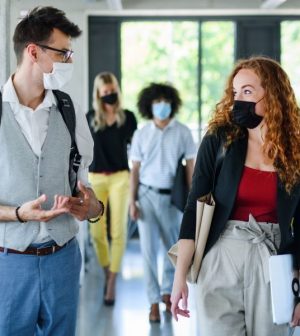- Recognizing the Signs of Hypothyroidism
- 10 Strategies to Overcome Insomnia
- Could Artificial Sweeteners Be Aging the Brain Faster?
- Techniques for Soothing Your Nervous System
- Does the Water in Your House Smell Funny? Here’s Why
- Can a Daily Dose of Apple Cider Vinegar Actually Aid Weight Loss?
- 6 Health Beverages That Can Actually Spike Your Blood Sugar
- Treatment Options for Social Anxiety Disorder
- Understanding the Connection Between Anxiety and Depression
- How Daily Prunes Can Influence Cholesterol and Inflammation
Polls Find Most U.S. Young People Take COVID Threat Seriously

Most young people do want to protect others from COVID-19, according to polls of 14- to 24-year-olds that suggest focusing on this message may be effective.
“Public health campaigns should leverage youths’ desire to protect others and not be the cause of spread,” said Dr. Kao-Ping Chua, an assistant professor of pediatrics at the University of Michigan in Ann Arbor.
Chua is senior author of a report in the May issue of the Journal of Adolescent Health that analyzed data from MyVoice, a national poll of young people. It allows open-ended answers to questions texted to a national sample of young people. The data was from several text-message polls taken in 2020.
About 86% of young people said they were moderately or very concerned about spreading COVID.
Eighty-nine percent of respondents said they wore masks or other face coverings all or most of the time. The most common reason they gave was so they wouldn’t spread the coronavirus.
Nearly 20% said they made exceptions when they were near people they considered close contacts or part of their “pod.” About 16% based their mask-wearing behavior on social cues that included whether they felt they could trust that the people they were with had been cautious about limiting their exposure.
“By and large, youth thought they were doing the right thing and following face covering guidelines, even when making exceptions. At the time our data were collected, youth were engaged and concerned about their impact on others, and overall wanted to do their part,” first author Melissa DeJonckheere, an assistant professor of family medicine, said in a university news release.
Researchers said, however, that young people may not be strongly motivated to get a vaccine to protect themselves. Therefore, a message like “Get a vaccine to protect your grandparents” might be more effective.
Nationwide, teens and young adults now represent an increasing share of COVID-19 cases. Those aged 16 and up are now eligible for vaccination.
Other recent MyVoice papers found similarly high percentages of youth reported following rules about social distancing but making exceptions for close contacts. In some situations, it seemed young people misinterpreted public health guidance.
More information
The U.S. Centers for Disease Control and Prevention has more information on COVID-19.
SOURCE: Michigan Medicine – University of Michigan, news release, April 23, 2021
Source: HealthDay
Copyright © 2026 HealthDay. All rights reserved.










